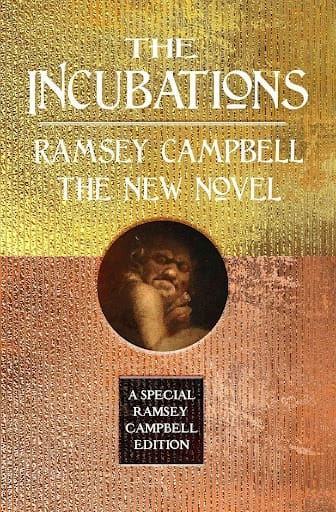Epeolatry Book Review: The Incubations by Ramsey Campbell

Disclosure:
Our reviews may contain affiliate links. If you purchase something through the links in this article we may receive a small commission or referral fee. This happens without any additional cost to you.

Title: The Incubations
Author: Ramsey Campbell
Genre: Horror, Supernatural Thriller
Publisher: Flame Tree Press
Date: 26th November, 2024
Synopsis: A collectable hardcover edition for Ramsey Campbell’s 60 years in publication.
Leo Parker’s stay in Alphafen seems idyllic, but after he leaves, the nightmares begin: an airport turns into a labyrinth, his own words become treacherous if not lethal, and what are those creatures in the photographs he took? Even the therapy Leo undertakes becomes a source of menace.
Perhaps Leo has roused an ancient Alpine legend. Even once he understands what he brought back, his attempts to overcome its influence may lead into greater nightmares still…
Released in a collectable hardcover edition to mark Ramsey Campbell’s 60 years in print, The Incubations shows no loss of form. After all these decades, Britain’s doyen of horror is still writing up a storm – and finding new tropes in contemporary life to riff off. His preceding novel, The Lonely Lands (2023), struck me as a caustic dose of post-Covid social criticism as much as a creepy tale of revenants, and The Incubations appears to extend the same strain into the post-Brexit era. I may be reading too much into a very accomplished straightforward horror story, but read on and bear with me.
The novel begins in media res with the protagonist, Leo Parker, in a nightmare of paraphasia that could come straight out of the casebook of Oliver Sacks, where his sudden difficulty with choosing the right words leads to a disastrous meltdown at his family driving school. The consequences ripple outwards in his home town of Settlesham (an imaginary burgh near Liverpool, the author’s birthplace), which turns out to be claustrophobically misanthropic and fixated on tragedies of the distant and recent past.
This is very much a verbal story, if that’s not a ridiculous observation to make. Much of the drama and the pervasive sense of disquiet is conveyed through dialogue. Failures to communicate, misunderstandings, non sequiturs, verbal disconnects, are a constant theme, to a degree that recalls Pinter or Ionesco. Recurrent references to the Second World War start to dovetail with this focus when Leo’s family tries to relate his linguistic problems to his recent visit to a chat buddy in Germany, in Settlesham’s twin town of Alphafen – a town with wartime Nazi associations. The implication is that these failures of understanding are willful and deliberate, rather than accidental breakdowns of language. Even the German town’s name has a hidden darker meaning; I’m not sure if Settlesham hints at Settle-sham, but I wouldn’t be surprised. It’s that kind of novel.
Settlesham seems haunted by memories of the war – or not so much haunted as obsessed with them, the deepest-seated and longest-lasting of the many resentments and grievances that constitute the populace’s character and worldview. Undercurrents of spleen and bile seem to run just under the surface of its streets. The most minor or innocent incident can trigger an outburst of abuse and accusation; most conversational openers come across as pounces. There’s hardly a verbal exchange between the denizens of Settlesham that isn’t some power play, or eruption of aggression, or suggestion of veiled suspicion. Even familial conversation is a web of evasions and emotional blackmail. For the social and even political dimensions of such attitudes, check out the diatribe of Councillor Bloore, one of the key instigators of the lingering animus between the two towns:
“We’re glad we got out of Europe and took our country back. Never should have cosied up to them in the first place. Don’t let them kid you they’ve got any love for us.”
Almost needless to say the vast majority of Germans in the story come across as infinitely more polite and congenial. And the most vocal fan of Hitler in the book is a Brit.
The genuinely supernatural manifestations behind the phenomena are fully evoked and explained – as far as a subtly suggestive myth can be – but still there’s the impression that these are no more than catalysts, releasing the victims’ inner fears and demons to torment them. Particularly fears of others – and with fear comes aggression and hate. This is very much a tale woven out of the dark threads in the individual and social psyche, as much as external darkness. As the protagonist’s father says, “Too many people ready to jump on everything you say round here.”
Campbell does touch very lightly on the familiar trope of Nazi occultism, but does not overwork it at the expense of the contemporary elements of unpleasantness. There’s also a tentative callback to Campbell’s Lovecraftian creation Daoloth, featured in his recent Three Births of Daoloth trilogy, but this volume keeps much to its own themes. There’s hardly any monstrosities or Gothic trappings. Instead, Campbell wrings tension and disquiet out of the most unlikely settings – an airport departure lounge and duty free, a public men’s room,etc. I won’t say any more about the exact nature of the nemesis that haunts the protagonist, because this is a novel you should be reading to know where the greatest living British horror writer has ended up in his dialogue with his country’s meanderings. In fact, if I’ve got one slight, personal criticism of the denouement, it’s that it might ever so slightly substantiate and justify Settlesham’s rancorous prejudices and grievances. Otherwise, this is very much a tale for our times, and a treat from a finely tuned ear.
![]() /5
/5












